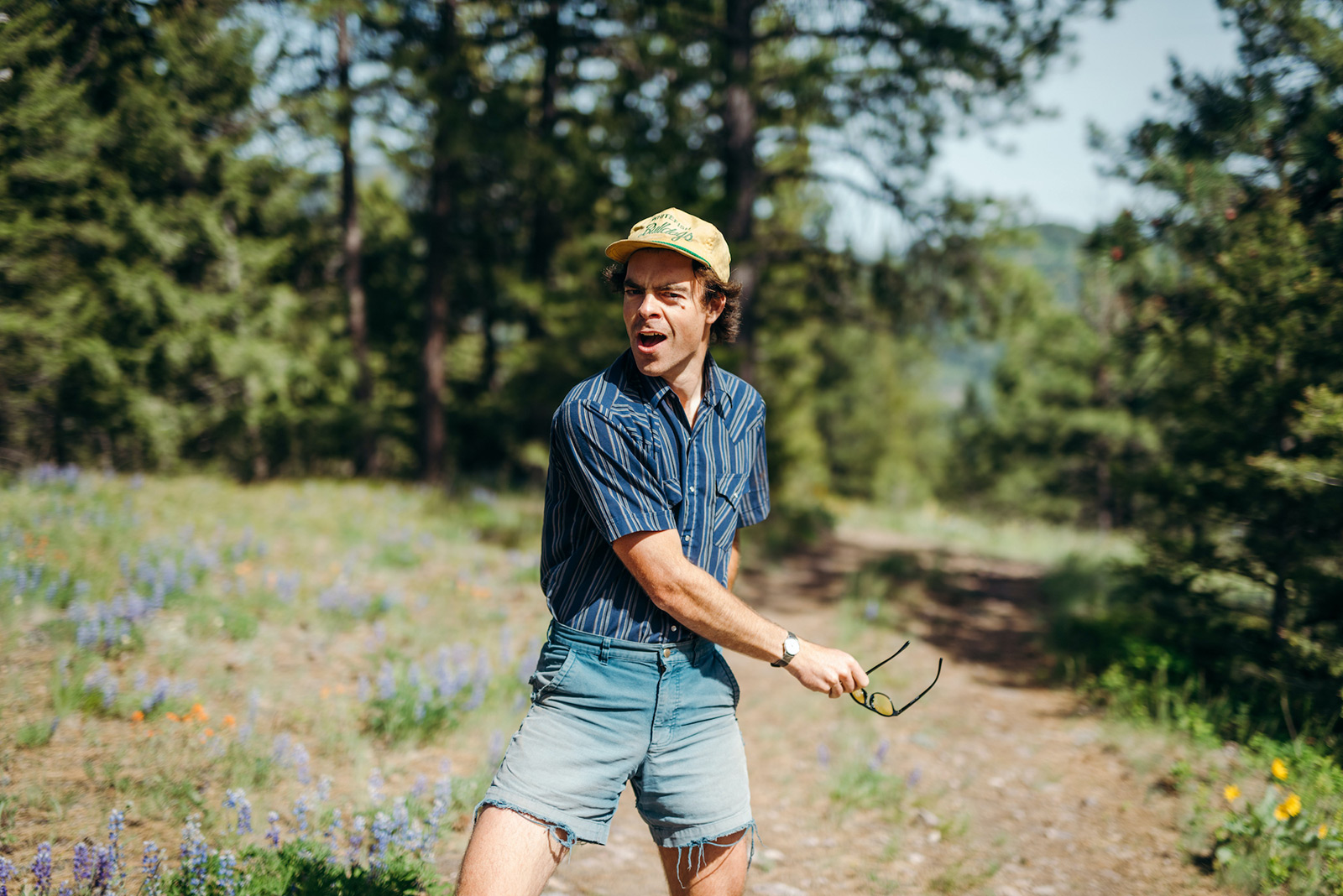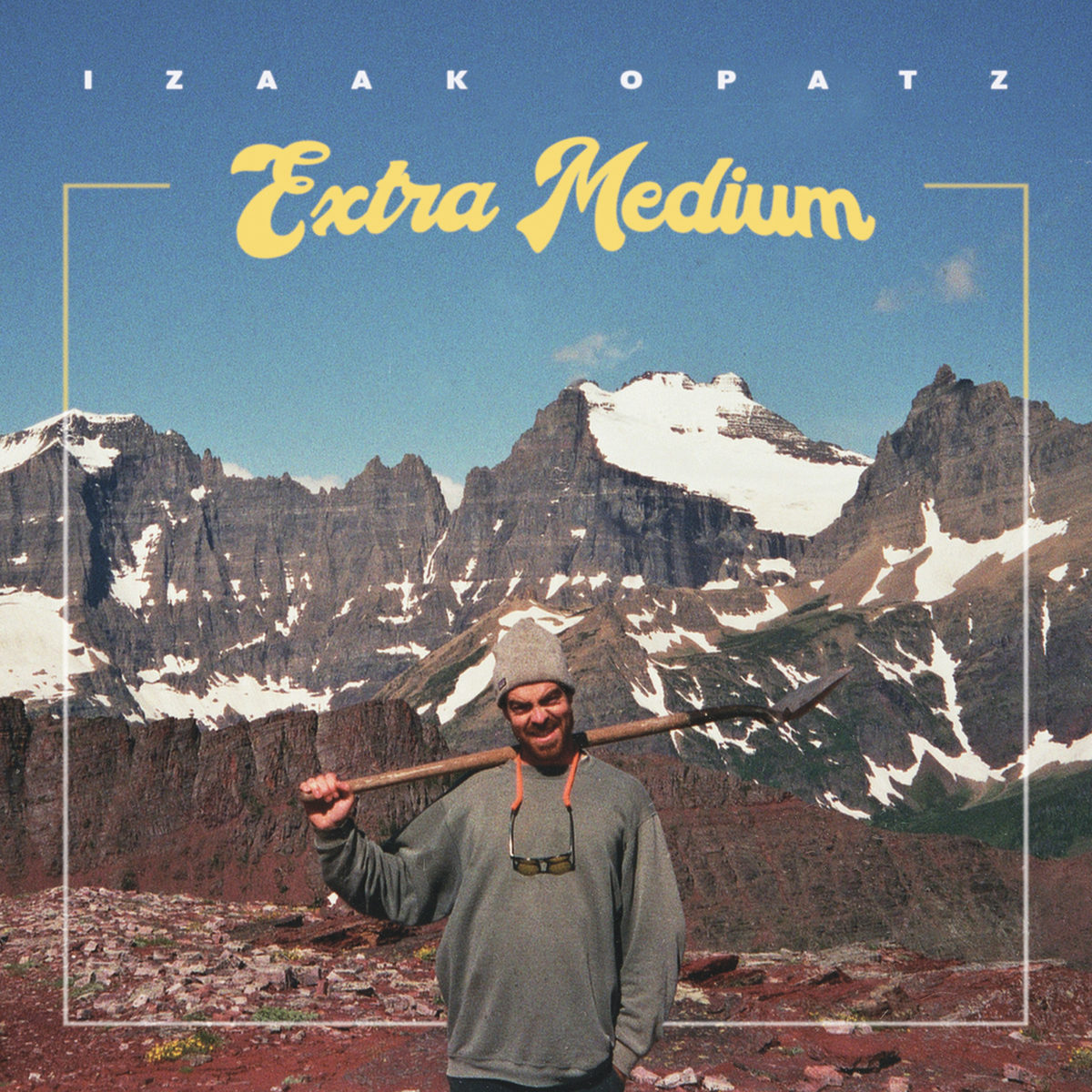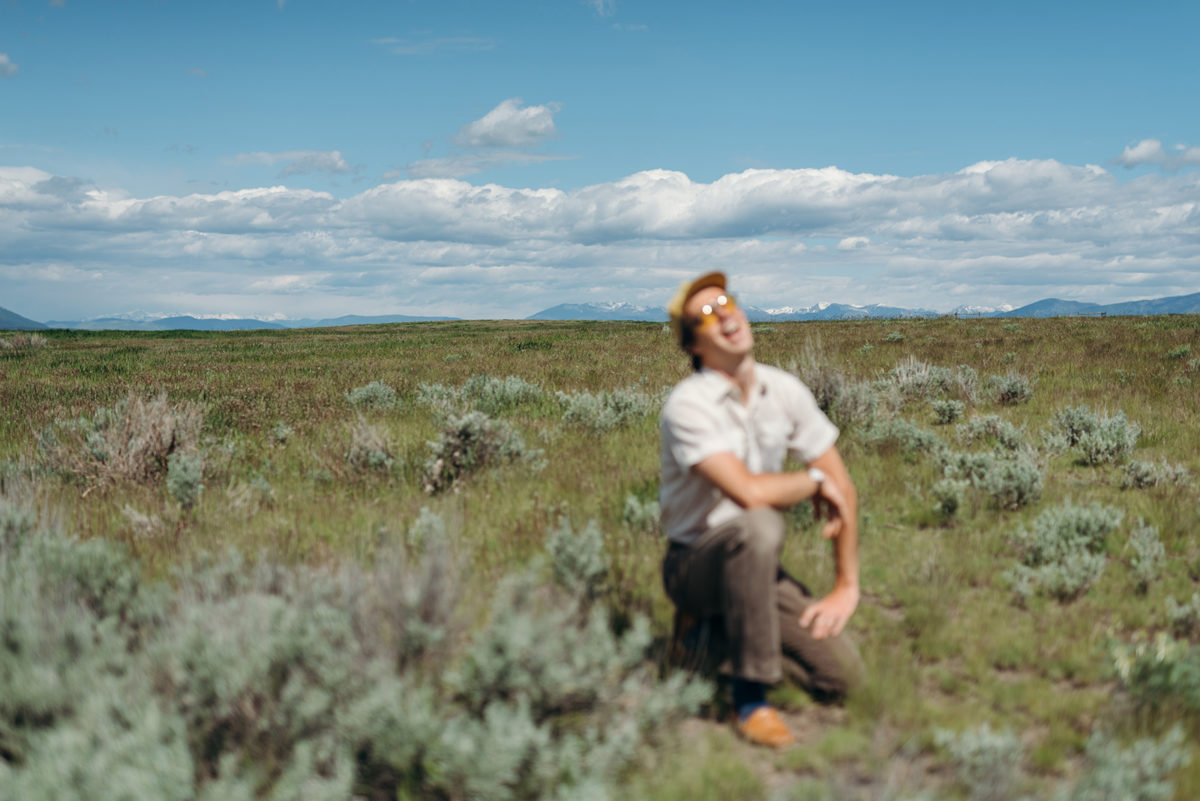Confessions of a Serial Songwriter
With his second album of original material, "Extra Medium," the Whitefish-born singer-songwriter Izaak Opatz solidifies his reputation as Montana's best-kept musical secret
By Tristan Scott
On a smoke-choked summer evening last August, Izaak Opatz climbed onto a flatbed trailer-stage in the parched lot behind JD’s Wildlife Sanctuary II, the lone tavern in the unincorporated town of Bynum, Montana, where the “Bynum If You Got ‘Em” music festival was underway. Eschewing his usual ensemble of Wranglers and cowboy boots in favor of khaki shorts and sandals to contend with the 92-degree heat, the Whitefish-born Opatz leaned into his microphone and, obscured by the haze of forest-fire smoke and Teton County dust, rejoined 500 world-weary festival-goers with a familiar ballad about an untethered soul mending a broken heart.
“In lieu of finding some reason to be, I always find some reason to leave, pour out the rest of the milk and hide a key. I’m never as happy as I am these days when I’m just stalling away, halfway there and in between, using the windshield as a TV screen.”
The song was “Shampoo,” the penultimate track off his new record, “Extra Medium,” and in that moment anyone unfamiliar with Opatz grasped what a dedicated coterie of fans (Opatz warmly refers to them as the “sensitive dirtbag set”) have known for more than a dozen years — on the shortlist of singer-songwriters who have not achieved widespread fame or name recognition but who consistently and intuitively tap a two-napkin gusher of a vein in their listeners, Opatz is among the best-kept secrets.
In addition to Opatz’s talents as a mellow-throated raconteur and nimble-fingered guitarist, he’s a self-described “compulsive metaphorager” and “inveterate wordplayboy” whose lyrical gymnastics imbue even the most well-worn corridors of the country-and-folk genres with convention-bending freshness, intermingling the classic country twang-and-bang with uncured confessional pop songs about heartbreak and resilience. Traversing the high-lonesome magic of Montana’s sprawling landscape while tracking between both coasts, Opatz dispatches a seemingly infinite fleet of “romantic Hindenburgs” that serve as combustible punchlines to his amorous mishaps.
But behind the playful lyrics is genuine heartache, confusion and yearning, and while it’s tempered by Opatz’s assurance that he is “an ungulate in life’s winter pasture, chewing on and metabolizing disappointment, heartbreak, and the other tough stuff into enjoyable musical carbohydrates,” to fall under his dizzying spell means encountering a full spectrum of emotions.
“Most of these songs orbit disappointment, but none of them land there, because writing each of them helped bend me from bitterness to some appreciation or deeper knowing,” Opatz says about “Extra Medium,” his second full-length solo album of original material and the follow-up to 2018’s “Mariachi Static.”

Recorded in January 2020, just before the coronavirus pandemic upended the music industry and wreaked havoc across all sectors of the arts, the anticipation surrounding “Extra Medium” is intensified due to the interminable holding pattern that has beset its release as the Portland-based Mama Bird Recording Co. works through a backlog of delayed records and a global vinyl shortage.
For Opatz and his creative collaborators, including multi-instrumentalist and producer Dylan Rodrigue and drummer, producer and sound engineer Malachi DeLorenzo, and especially for his fans, the wait is over on April 29.
Like many of his musical opportunities, Opatz’s connection to Mama Bird was serendipitous, born of a chance encounter with a Portland-based music critic at a show in Missoula, where Opatz’s former band, The Best Westerns, was performing. (The Best Westerns’ debut and only recorded album, “High Country,” was named CMT’s “best country album we never heard of” in 2014, and Opatz has written a new a song about the time the band opened for legendary Americana singer-songwriter James McMurtry in what was supposed to be their big break. Instead, the show was catastrophic and the attendant story hilarious.)
His relationship to Mama Bird has proven invaluable, however, with the recording company re-releasing Opatz’s debut album and producing “Extra Medium,” which will officially launch next week at a show with Dean Johnson in Missoula and can be pre-ordered online at izaakopatz.com.
Still, despite having toured extensively and garnered critical acclaim, notably earning a spot on Rolling Stone’s 2018 list of the “10 New Country Artists You Need to Know,” and entertaining the masses with his country covers album “Hot and Heavy Handed,” Opatz is far from a household name, due in part to his own reluctance to invest all his energy into songwriting and performing, despite the pressure from his musical peers.
“I have felt that pressure. And I have seen it weigh on other people,” Opatz said recently from his home in Missoula. “Some people kind of have this desperation that you have only so long to make an impression and take your shot. And I think that’s true. I realize I am kind of limiting myself through my unwillingness to just do this one thing and do it all the time and as hard as I can. And part of that is, I just don’t think I have the chemistry for it.”
He continued: “It’s definitely a Catch-22 because I think I might be more successful if it had to work out for me but I don’t want to be subject to that. I think I would lose myself if my identity hinged entirely on being successful as a musician. So I have tried to slow down, which comes at the expense of the expansion of my music or whatever that means in terms of growing my market or my reach. Instead I have tried to stay a little more whole, and that means working other jobs, working an hourly wage, going back to school, and building a foundation for some sort of professional career.”

To that end, when he’s not composing original songs or playing gigs at far-flung venues like JD’s Wildlife Sanctuary II in Bynum, Pep’s Bar and Lanes in Big Sandy or Kip’s Beer Garden in Browning, he swaps out his guitar pick for an edge beveler and an awl haft at his custom leather shop. Or he spends a summer working on Glacier National Park’s trail crew. Or kicks sod as a landscaper in Los Angeles. Or slings breakfast tacos in Nashville. Or plays tennis. Or goes for a run.
“He’s an unknown legend but he creates his own lore,” said Jonny Fritz, another Montana-bred lyrical acrobat whose country-music bonafides include albums like “Sweet Creep,” which Rolling Stone hailed as one of the best Country Albums of 2016. (Fritz is also the eccentric artist who coined the term “Dad Country” to characterize the sub-genre of off-kilter country, roadhouse rock and electric folk that befits his and Opatz’s tastes and temperaments better than “Outlaw Country” or “Country Rock” or even “Alt-Country,” although Opatz has since refined the category even further by bracketing his songs as “Dirtwave.”)

It was Fritz who accepted the role of mentor when Opatz joined him, first in the country-music epicenter of Nashville and later in Los Angeles, where he took the first of several stabs at kick-starting his career as a full-time musician in earnest. In addition to meeting and collaborating with a raft of talented musicians, Opatz learned to tool leather as an apprentice to Fritz, who made ends meet by filling holiday orders through his custom leather shop, Dad Country Leather. Opatz supplemented with other odd jobs, too, but when the musical momentum began building to full-froth, Opatz returned home to Montana, either for seasonal work as a “trail dog” in Glacier, where he’s logged a dozen seasons, or, most recently, to attend graduate school in Missoula.
“I was recently visiting a friend of mine in Nashville and I was telling her about Izaak for the fifth or sixth time and she stopped me and said, ‘Jonny, not only have you told me about Izaak on this trip, but you tell me about Izaak on every trip, and the last time we went out to lunch I came back from the bathroom and you were telling a table full of strangers next to you about Izaak,'” Fritz recalled in an interview. “I am just so inspired by him and I think it’s necessary to spread the gospel of Izaak. There’s some serious magic in him.”
He continued: “There are people in this world who you think, ‘oh no, you can’t do anything else but make music.’ But for somebody like Izaak, his music is already absolutely timeless and I am going to be listening to it until I am a very old man and I don’t think he is ever going to lose his relevance. I don’t think we are going to lose anything, because whatever he does it’s adding to his own lore, whether that’s working trail crew in Glacier National Park or working in his leather shop, I just trust him implicitly.”